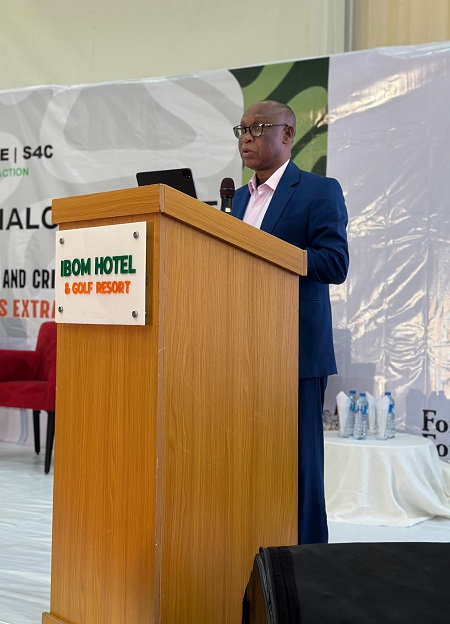Dr. Orji Ogbonnaya Orji, Executive Secretary of NEITI
…Also proposes three-Pronged Agenda for Nigeria’s energy transition and climate justice
The Nigeria Extractive Industries Transparency Initiative (NEITI) has proposed three interconnected pillars to guide Nigeria’s energy transition and climate justice initiatives. These pillars include deployment of data to guide decision making, inclusive policy making that elevates voices of host communities and vulnerable population and implementation of reforms that include protocols for divestment and decommissioning, Legal safeguards for community benefit and environmental responsibility and incentives for local beneficiation and extractive-driven industrialization of Nigeria’s solid minerals endowment.
The Executive Secretary of NEITI, Dr. Orji Ogbonnaya Orji outlined the agency’s proposal at the 4th edition of the National Extractive Dialogue (NED 2025) which commenced this Wednesday in Uyo, Akwa Ibom State.
Dr Orji, told the audience that the theme of NED 2025 ‘Transitions, Divestments, and Critical Minerals: Charting a Just Future for Nigeria’s Extractive Sector’ implores a look “beyond resource extraction and profit, towards a future that is anchored on justice, sustainability, inclusion and shared prosperity”.
According to Dr. Orji, NEITI is supporting the Nigerian government on its energy transition journey by conducting “A comprehensive research study on energy transition’s impact on Nigeria’s economy aimed at providing data to guide fiscal planning, protection of livelihoods and alignment with Nigeria’s Energy Transition Plan and the Climate Change Act”.
This he said is part of NEITI’s strategic response to the risks and opportunities emerging from the global shift to renewable energy.
Furthermore, “NEITI Launched its Data Center as its Digital Transparency Backbone, with real-time, automated, and centralized extractive sector data which will enable automated disclosures and regulatory integration”.
The Executive Secretary added that NEITI is also advancing transparency in the solid minerals sector by tracking surging royalties payments such as gold at ₦2.92 billion, lithium at ₦398.19 million, tin at ₦540.7 million, and linking these to community development and national beneficiation”.
Dr. Orji urged stakeholders to collaborate in leveraging NEITI’s credible data to drive transparency and sustainable development, adding that NEITI has adopted an Energy Transition & Climate Accountability Framework that mandates its oversight of oil and gas assets divestments, track greenhouse gas emissions, monitor Host Community Development Trusts, and produce biannual climate performance reports. “There can be no justice without data. No reform without records. No future without facts,” Dr. Orji enthused.
He called on the “Federal and State Governments to embed NEITI data into national planning and budgeting; Regulators to act on audit findings and strengthen enforcement and Companies to go beyond compliance and lead on environment, social and governance principles”. Furthermore, “Civil Society should use NEITI data for constructive accountability while Development Partners should support capacity building, innovation, and technology for transparency in the spirit of shared responsibility”, Dr Orji explained.
Dr. Orji outlined a three-part plan for a just future, emphasizing real-time governance leveraging the Data Center, inclusive dialogue with host communities, women, youth, and artisanal miners, and actionable outcomes like divestment protocols, community safeguards, and local industrialization incentives.
The Executive Director, Spaces4Change, and Convener of NED 2025, Mrs Victoria Ohaeri-Ibezim, called for a reimagined, equitable future for extractive governance. “Nigeria cannot afford to stumble blindly into this new era. Not again,” she said, emphasizing that NED 2025 is a rallying point for bold, collective action to redefine the sector’s future through regulation, environmental accountability, and community protection.
The Chairman Senate Committee on Solid Minerals Development and the representative of Akwa Ibom South Senatorial District, Senator Ekong Sampson, warned that communities most affected by extractive activities particularly in resource-rich states like Akwa Ibom, risk being left behind yet again if the current wave of divestments is not properly regulated.
“We must seize this moment to institutionalize fairness, responsibility, and sustainability across all extractive practices. The transition must be just, not just in policy, but in practice,” he stated.
Senator Ekong called for stronger legislative and institutional safeguards to ensure that environmental liabilities are not transferred or abandoned, that Host Community Trust Funds under the PIA are transparently operationalized, and that Nigeria is equipped to responsibly harness its critical minerals like lithium and cobalt. He pledged the support of the Senate in advancing legal frameworks that will protect national interest and local communities.
The Chairman, House Committee on Solid Minerals Development, Honourable Gaza Gbefwi, emphasized Nigeria’s potential to lead in the clean energy supply chain through its critical mineral reserves. He called for a Critical Minerals Development Bill, enhanced geological surveys, local processing, and robust community safeguards.
Hon. Gaza Gbefwi stated that: “Nigeria cannot afford to be a bystander in the global clean energy revolution. We must be deliberate, not just in extracting critical minerals, but in governing them with foresight, justice, and national purpose.”
The Director General National Oil Spill detection and response Agency (NOSDRA), Engr Chukwuemeka Woke, stressed the increasing risk of stranded environmental liabilities, since assets being divested often come with legacy of decades-long oil pollution, abandoned infrastructure, and un-remediated spill sites. He urged for strong environmental oversight and community engagement to avoid past mistakes in mineral extraction.
The Communication & Government Relations Manager at the Oil Producers Trade Section (OPTS), Ms. Lola Adelore representing the Executive Director, Mr. Gwueke Ajaifia, stated that the OPTS has been an enduring partner in promoting transparency and sustainability, and remains firmly committed to fostering responsible practices across the sector.
He highlighted that the OPTS viewed this partnership as a platform for continuous improvement and open dialogue on legacy challenges, the energy transition, and inclusive development.
“As Nigeria embarks on a new era of resource governance—navigating divestments, strengthening community safeguards, and recognizing the vital role of critical minerals—we look forward to a collective journey defined by openness, equity, and shared responsibility”, Mr. Ajaifia stated.
NED 2025 was convened by Spaces for Change in partnership with NEITI, NOSDRA, and the Ministry of Solid Minerals Development with support from Found Foundation.


Comment here